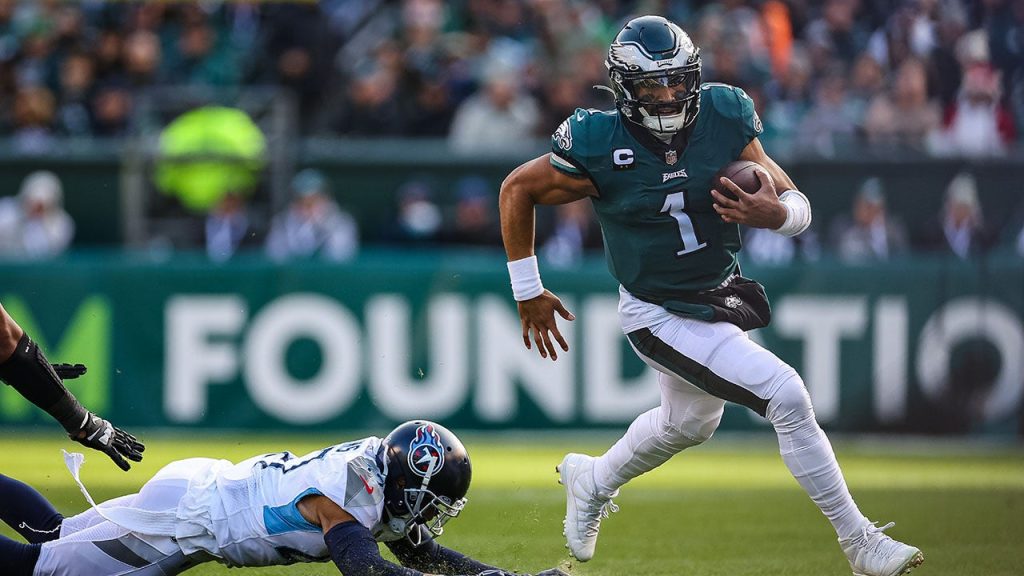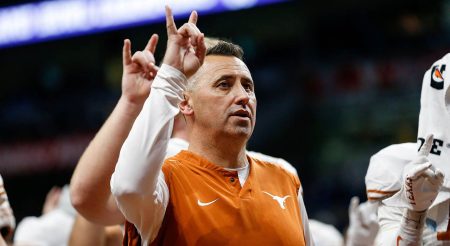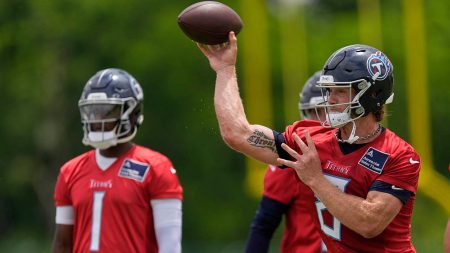The Philadelphia Eagles are preparing for a crucial NFC Championship game against the Washington Commanders, with the health and effectiveness of their star quarterback, Jalen Hurts, a central concern. Hurts, a dual-threat quarterback with 630 rushing yards in the regular season, injured his knee in the divisional round against the Los Angeles Rams. While he played through the injury, his mobility appeared limited, raising questions about his ability to contribute fully to the Eagles’ offense. This uncertainty casts a shadow over the Eagles’ game plan and presents a challenge for both their offensive and defensive strategies.
Hurts’ running ability is a key component of the Eagles’ offensive scheme. Designed quarterback runs are a regular feature, adding another dimension to their attack and forcing defenses to account for his mobility. However, his knee injury poses a dilemma for the Eagles’ coaching staff. They must balance the risk of further injury to their star quarterback against the need to utilize his unique skillset. Overreliance on Hurts’ running ability could expose him to further injury, while limiting his mobility could restrict the Eagles’ offensive potential. This delicate balancing act will be a crucial factor in determining the outcome of the NFC Championship game.
The Washington Commanders’ defensive coordinator, Joe Whitt Jr., has stated his intention to target Hurts if he chooses to run. Whitt emphasized that if Hurts runs the ball, the Commanders will “treat him like a running back,” implying a more physical approach to tackling the quarterback. This aggressive strategy poses a significant risk for Hurts, given his existing knee injury. The Commanders’ willingness to target Hurts physically adds another layer of complexity to the Eagles’ offensive game plan.
The Eagles are understandably cautious about Hurts’ usage. Head coach Nick Sirianni acknowledged the potential risks and emphasized the team’s commitment to protecting their quarterback. He highlighted the importance of having Hurts on the field and the need to balance his contributions with his health. This careful approach suggests that the Eagles may opt for a more conservative game plan, minimizing designed runs and prioritizing Hurts’ passing game. While this strategy might protect Hurts from further injury, it could also limit the Eagles’ offensive firepower.
The two previous encounters between the Eagles and Commanders this season offer further insight into the potential dynamics of the NFC Championship game. In Week 11, Hurts ran for 39 yards and a touchdown in an Eagles victory. However, in their second meeting, Hurts suffered a head injury after a 13-yard run, forcing him out of the game, which the Eagles subsequently lost. These contrasting outcomes underscore the importance of Hurts’ health and the impact of his presence on the field. The Commanders’ defense clearly poses a threat to Hurts, and his ability to withstand their physicality will be a key factor in the outcome of this pivotal game.
The Eagles are favored to win the NFC Championship game and advance to the Super Bowl. However, Hurts’ injury introduces a significant element of uncertainty. The Commanders’ defense will undoubtedly look to exploit this vulnerability and pressure Hurts both in the pocket and on the ground. If Hurts’ mobility is significantly limited, the Eagles’ offense could struggle to generate consistent yardage and points. Conversely, if Hurts can perform at his usual level, the Eagles’ chances of victory increase significantly. The game hinges on Hurts’ health and performance, making it a compelling narrative with potentially significant repercussions for both teams.










